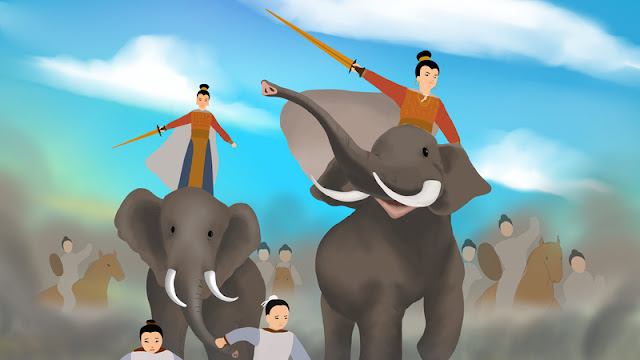
Hai Ba Trung, which means "the two Trung sisters" in Vietnamese, were two sisters who played a significant role in Vietnamese history. They are considered as national heroines and their story is a symbol of Vietnamese resistance against foreign invasion.
Trung Trac and Trung Nhi were born in the year 12 AD in Giao Chi, which is now known as Northern Vietnam. They were born to a noble family and were well-educated. During their time, Vietnam was under the rule of the Han dynasty of China, which was oppressive towards the Vietnamese people.
In 39 AD, the Trung sisters led a rebellion against the Chinese rulers of Vietnam. They gathered an army of around 80,000 soldiers, mostly peasants, and common people who were tired of Chinese oppression. The sisters fought bravely and won several battles against the Chinese army. They were able to capture many cities and establish a short-lived independent state in Vietnam.
The rebellion of the Trung sisters was the first recorded historical resistance against Chinese rule in Vietnam. It inspired other rebellions in the future, and it helped to shape Vietnamese national identity. The sisters are still celebrated as national heroines in Vietnam, and there are many statues and monuments dedicated to them throughout the country.
In conclusion, Hai Ba Trung, the two Trung sisters, were important figures in Vietnamese history. Their rebellion against Chinese rule inspired other rebellions and helped to shape Vietnamese national identity. They are remembered as national heroines and continue to be celebrated in Vietnam.
- What were the key factors that led the Trung sisters to lead a rebellion against the Chinese rulers of Vietnam?
- What impact did the rebellion of the Trung sisters have on the subsequent history of Vietnam, both in terms of resistance to foreign rule and the development of Vietnamese national identity?
- How are the Trung sisters remembered and celebrated in modern-day Vietnam? Are there any controversies or debates about their legacy?
- How does the story of the Trung sisters compare to other examples of women leaders and warriors in history, both in Vietnam and in other parts of the world?
- What lessons can we learn from the story of the Trung sisters, in terms of leadership, resilience, and resistance to oppression? How might these lessons be relevant to contemporary issues and challenges, both in Vietnam and globally?
Post a Comment